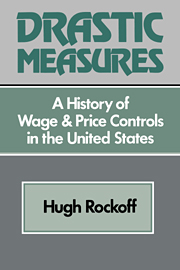Book contents
- Frontmatter
- Contents
- Editors' preface
- Preface
- 1 The debate over controls
- 2 Forgotten experiments
- 3 World War I
- 4 World War II: Attacking inflation directly
- 5 World War II: The market under controls
- 6 The Korean War
- 7 The Vietnam War
- 8 Lessons for the recent crisis
- Notes
- Bibliography
- Name index
- Subject index
2 - Forgotten experiments
Published online by Cambridge University Press: 02 December 2009
- Frontmatter
- Contents
- Editors' preface
- Preface
- 1 The debate over controls
- 2 Forgotten experiments
- 3 World War I
- 4 World War II: Attacking inflation directly
- 5 World War II: The market under controls
- 6 The Korean War
- 7 The Vietnam War
- 8 Lessons for the recent crisis
- Notes
- Bibliography
- Name index
- Subject index
Summary
The attempt of New England to regulate prices is extremely popular in Congress, who will recommend an imitation of it to the other States. For my own part I expect only a partial and a temporary relief from it, and I fear that, after a time, the evils will break out with greater violence. The water will flow with greater rapidity for having been dammed up for a time. The only radical cure will be to stop the emission of more paper, and to draw in some that is already out, and devise means effectually to support the rest.
John Adams to Abigail, February 7, 1777It is frequently said that opponents of price controls are preaching that “old time religion,” faith in laissez-faire. By contrast, presumably, controls represent something new. To the historian of price controls this sort of statement must be considered simply as a symptom of historical myopia; government regulation of economic life was more the rule than the exception in colonial America. The rate of interest, the weight and price of bread, the fees of lawyers and physicians, and the wages of numerous workers such as carters, porters, and gravediggers were all subject to regulation at one time or another. More to the point, a number of colonies also experimented with comprehensive controls over wages and prices. Let us review briefly the experience in two colonies, Virginia and Massachusetts Bay: Virginia because it witnessed both the first settlement and the first experiment with comprehensive wage and price controls; Massachusetts Bay because the Puritans were the most persistent about controls.
Information
- Type
- Chapter
- Information
- Drastic MeasuresA History of Wage and Price Controls in the United States, pp. 14 - 42Publisher: Cambridge University PressPrint publication year: 1984
